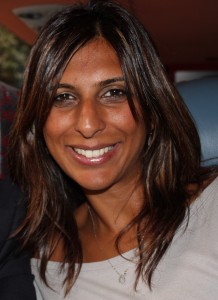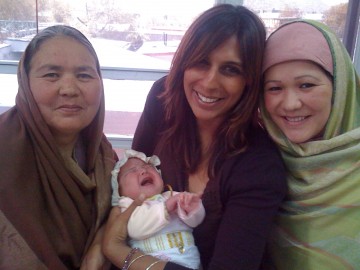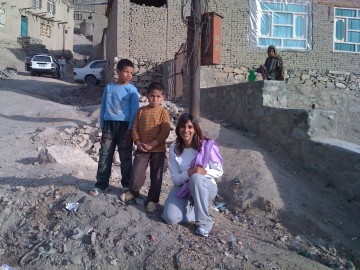Dr. Ashnoor Nagji: An Active Agent of Change – article by Sara Eftekhar (UBC Nursing 2)
“Contributing to the planet and its people makes me feel so alive.”
Dr. Ashnoor Nagji, is an energetic, fearless and enthusiastic physician who describes one of her passions as “partnering with marginalized populations for the enhancement of individual and collective wellbeing, particularly with a focus on women and children.”
She has worked, travelled and volunteered in over 85 countries. From interning at the Aga Khan Health Services in Northern Pakistan, to appreciating the role of primary care in Tanzania and devising cultural competencies in an Afghan Refugee camp in Karachi, Dr. Nagji strives to look at health from a cultural and socioeconomic perspective. If those projects have not kept her busy, she has also supported public health projects in Mumbai’s slums and partnered with Aboriginal communities in the Arctic, Australia, New Zealand, and at home in Vancouver’s Downtown Eastside. For her exemplary efforts locally and globally, Dr. Nagji was selected for an Award of Excellence in 2010 by the Ontario College of Family Physicians. “I’ve always had a passion for international health. There is just something in me that continuously gravitates towards it. I love Canada and its values of pluralism, democracy and universal health care, but I think there’s so much work that needs to be done around the world. And for those of us who are educated and who have access to all of this knowledge, it’s our responsibility to give back and be that spark for individuals in the community that are less fortunate.” Dr. Nagji explains.
Trained in medicine at the University of Ottawa, Dr. Nagji completed her residency in Family and Aboriginal Medicine at UBC, though her first international experience was traveling to Guyana as an undergrad with Youth Challenge International. There, doing HIV education and building a guest house to generate income in a rural Guyanese community, she was inspired to be a catalyst and founded BELIEF (Becoming Educated Leaders Inspired by Exemplary Females) a platform for empowering young women to come together through dialogue which now operates in 18 Canadian sites.
Out of all of her international travel experiences, Dr. Nagji strongly believes health and community development go hand in hand. One thing she well appreciates is that projects that are grass roots, community driven, inclusive, and created together in teams to address the needs of the community, are the ones that will be sustainable and the ones that the international community ought to be involved with.
Dr. Nagji believes that working abroad has helped her as a physician. One of the benefits she identifies is the ability to relate to diverse populations in Canada. “Being abroad has allowed me to relate to people in [Vancouver’s ] heterogenous society, where there are people from different races and cultures. When you go in to see a patient from Japan for example, who might be very anxious and where there’s a language barrier present, you think to yourself, ‘well I haven’t been to Japan in a long time but I can say two words in Japanese’. Then when you say those two words, all of the sudden the patient lights up and asks you questions about your travels, what you thought about the country, etc. It’s such an important starting point to build a relationship with your patients and to assure them that we’re both on the same page.”
Recently, Dr. Nagji returned from volunteering on a year long project in conflict ridden Kabul, Afghanistan. There, she directed her team to initiate a women’s cervical screening program. Given that the Afghan health care system remains in its infancy, prevention unfortunately does not become a priority in the agenda of health care. To advocate for women’s health in such circumstances, she trained Afghan female allied health staff to offer Pap screens, and complemented it by culturally appropriate patient medical education resources that the clinic team designed for both men and women around cervical screening. It was one project where Dr. Nagji saw that the positive impact it had in the community and its potential reach in the future.
“[Global health] has to be a balance between taking the best of what the West has to offer, such as new discoveries or best practices, and taking that across the border in order to really optimize what you can give and take, and to couple that with being a catalyst of change in the community. Above all, you have to realize that real progress can be made when you’re working together. You can’t be the superhero that puts on a cape to solve the world problems, you’re going to have to do your small bit and you’re going to have to do it with other people who have aligned visions.”
Dr. Nagji can’t predict which country she’ll end up in next, but she hopes to strike a balance between finding the continuity of care for her patients in Vancouver and working in a practice which allows and supports global health.


